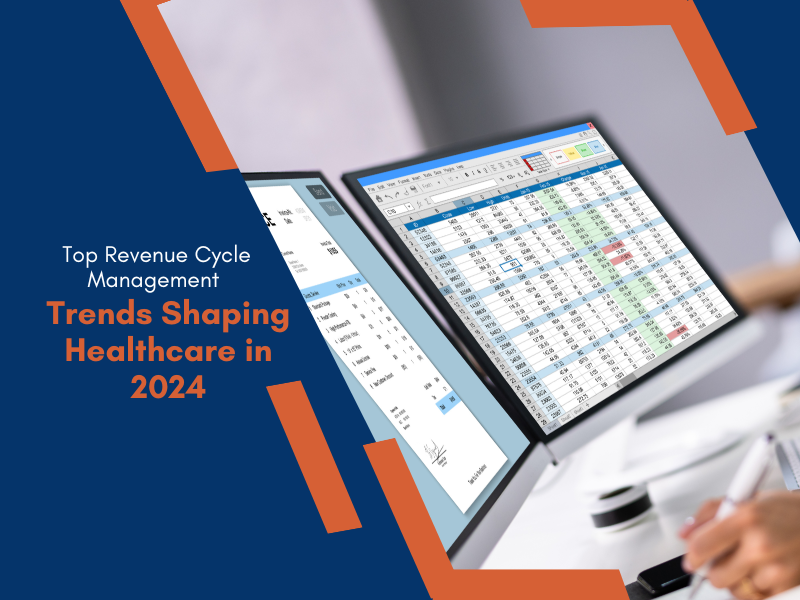Table of Contents
In 2024, the healthcare industry continues to evolve at a rapid pace, with advancements in technology, shifting regulations, and new patient expectations reshaping how organizations manage their revenue cycle. Revenue Cycle Management (RCM) is the lifeblood of healthcare organizations, encompassing all the administrative and clinical functions that contribute to capturing, managing, and collecting patient service revenue. Effective RCM ensures that healthcare providers are adequately reimbursed for the services they deliver, while also enhancing patient satisfaction and ensuring compliance with regulatory frameworks.
As healthcare systems face increasing pressure to deliver high-quality care in a cost-effective manner, optimizing revenue cycle processes is more important than ever. Let’s dive into the top RCM trends shaping the healthcare landscape in 2024.
1. Artificial Intelligence (AI) and Machine Learning Integration
One of the most transformative trends in 2024 is the integration of artificial intelligence (AI) and machine learning (ML) into RCM processes. AI has the potential to streamline repetitive tasks, reduce human error, and improve efficiency across various RCM functions. By automating key processes such as claims submissions, payment posting, and denial management, healthcare organizations can minimize delays, reduce denials, and maximize revenue capture.
AI-driven predictive analytics also enable healthcare providers to anticipate potential revenue shortfalls, improve patient payment collections, and optimize staffing. Machine learning algorithms can analyze historical data to identify trends in patient payment behaviors and predict which claims are more likely to be denied. This helps revenue cycle teams proactively address issues before they impact cash flow.
Moreover, AI-driven chatbots are being used for patient engagement, answering billing-related questions, and improving the overall patient experience by offering round-the-clock support.
2. Telehealth Billing and Coding Optimization
With the pandemic sparking widespread adoption of telehealth services, healthcare providers have had to adjust their billing and coding practices to account for virtual care. Telehealth billing and coding will remain a critical focus in 2024 as these services continue to grow in popularity. Providers must navigate a complex web of regulations, reimbursement policies, and coding updates to ensure they are properly compensated for virtual visits.
Many payers have updated their guidelines for telehealth reimbursement, but inconsistencies between payers can create confusion for healthcare organizations. In response, Revenue Cycle Management teams are investing in technology solutions that streamline telehealth billing, ensuring that claims are submitted accurately and in compliance with payer requirements.
Additionally, automated coding tools powered by AI are helping to improve coding accuracy for telehealth services, reducing the risk of claim denials and ensuring providers are fairly reimbursed.
3. Increased Focus on Patient Financial Experience
As healthcare costs continue to rise, patients are becoming more financially responsible for their care through higher deductibles, co-pays, and coinsurance. In 2024, the patient financial experience is at the forefront of Revenue Cycle Management strategies. Healthcare providers are recognizing that improving the patient’s financial journey—from price transparency to payment options—can have a direct impact on revenue collection and patient satisfaction.
To address this, many organizations are investing in patient financial engagement platforms that offer personalized payment plans, upfront cost estimates, and convenient digital payment options. Providing patients with clear, accurate billing information and flexible payment options can enhance their overall experience and reduce the likelihood of bad debt.
Hospitals and clinics are also leveraging digital tools to educate patients about their insurance coverage and out-of-pocket costs before their visit. These tools improve the transparency of healthcare costs, helping patients make informed decisions and increasing the likelihood of prompt payments.
4. Value-Based Care and its Impact on RCM
The shift from fee-for-service to value-based care continues to gain momentum in 2024, with a growing emphasis on quality outcomes rather than volume of services. This shift is reshaping how healthcare providers manage their revenue cycle. In a value-based care model, providers are reimbursed based on the quality of care delivered and patient outcomes, rather than the number of procedures performed.
This trend requires Revenue Cycle Management systems to be more sophisticated, capable of tracking and reporting on quality metrics, patient outcomes, and the cost-effectiveness of care. Providers are adopting population health management tools and care coordination platforms to help them manage patient outcomes more effectively while ensuring that their services are adequately reimbursed.
Additionally, bundled payments and shared savings arrangements are becoming more common in value-based care models, requiring Revenue Cycle Management teams to adjust their processes to account for these new payment structures. Efficiently managing these complex payment models is essential for maintaining financial viability in a value-based care landscape.
5. Healthcare Interoperability and Data Exchange
In 2024, the push for greater interoperability and data exchange between healthcare systems is transforming how Revenue Cycle Management processes are managed. Seamless data sharing between providers, payers, and patients is essential for accurate billing, coding, and claims processing. The use of FHIR (Fast Healthcare Interoperability Resources) standards and other interoperable frameworks is enabling more efficient exchange of clinical and financial data.
With greater access to comprehensive patient data, Revenue Cycle Management teams can ensure that claims are submitted with accurate and up-to-date information, reducing the likelihood of denials due to missing or incorrect data. Interoperability also improves care coordination, allowing providers to deliver more personalized care and ensuring that billing reflects the full scope of services provided.
Blockchain technology is also emerging as a potential solution for improving healthcare data exchange and security. By providing a decentralized, tamper-proof ledger for patient data, blockchain could streamline billing processes, reduce fraud, and improve the transparency of healthcare transactions.
6. Rise of Outsourced RCM Solutions
As the complexity of revenue cycle management increases, more healthcare organizations are turning to outsourced Revenue Cycle Management solutions to manage their financial processes. Outsourcing allows providers to focus on delivering patient care while leaving the intricacies of billing, coding, and collections to specialized third-party firms.
In 2024, the demand for outsourced Revenue Cycle Management services continues to rise, particularly among smaller healthcare practices that may lack the resources to manage their revenue cycle in-house. RCM outsourcing companies offer expertise in navigating the ever-changing regulatory landscape, ensuring compliance, and maximizing reimbursement.
Outsourcing also offers scalability, allowing healthcare organizations to adjust their RCM operations as their patient volumes fluctuate. By partnering with a trusted RCM provider, healthcare organizations can improve their financial performance and reduce administrative burdens.
7. Denial Management and Recovery Solutions
With denial rates on the rise, denial management remains a top priority for healthcare organizations in 2024. Denied claims can result in significant revenue loss if not properly addressed, making it essential for Revenue Cycle Management teams to have a robust denial management strategy in place.
In response to this challenge, healthcare organizations are adopting automated denial management tools that use AI and machine learning to identify the root causes of claim denials and recommend corrective actions. These tools can help prevent future denials by ensuring that claims are submitted accurately the first time and by providing real-time feedback on potential issues.
Additionally, some organizations are partnering with third-party revenue recovery services that specialize in resolving denied claims and recouping lost revenue. By outsourcing denial management to experts, healthcare providers can reduce the time and resources spent on resolving claim issues, ultimately improving their cash flow.
8. Regulatory Compliance and Cybersecurity
As healthcare regulations continue to evolve, maintaining regulatory compliance is a critical concern for RCM teams in 2024. Healthcare providers must stay up-to-date with the latest coding updates, payer requirements, and government regulations to avoid penalties and ensure that their revenue cycle processes are compliant.
Cybersecurity is another pressing issue, particularly as more healthcare data is stored and transmitted electronically. Revenue Cycle Management teams must implement strong data protection measures to safeguard sensitive patient information from cyberattacks and data breaches. Healthcare organizations are increasingly adopting zero-trust security frameworks and investing in advanced encryption technologies to protect their data.
Compliance with HIPAA and other privacy regulations is essential for maintaining patient trust and avoiding costly fines. As cybersecurity threats continue to evolve, Revenue Cycle Management teams must remain vigilant in protecting their systems and data from malicious actors.
Conclusion
In 2024, revenue cycle management is more dynamic and complex than ever, with emerging technologies, patient expectations, and regulatory changes shaping the future of healthcare operations. To stay competitive, healthcare organizations must embrace these trends and invest in solutions that optimize their revenue cycle processes.
Apaana Healthcare is at the forefront of these innovations, driving operational excellence with global healthcare management solutions. We specialize in outsourced services for health plans, covering member enrollment, claims administration, medical billing & coding, and provider engagement. Our expertise ensures that our clients benefit from cost-effective solutions, streamlined operations, and improved financial performance. Partner with Apaana Healthcare to navigate the evolving Revenue Cycle Management landscape and achieve success in 2024 and beyond.
FAQs
What is Revenue Cycle Management (RCM)?
Revenue Cycle Management (RCM) encompasses the administrative and clinical processes that ensure healthcare providers capture, manage, and collect revenue for the services they deliver, while also ensuring compliance with regulations.
How does AI impact Revenue Cycle Management in 2024?
AI streamlines RCM by automating repetitive tasks, reducing errors, improving claims submissions, and offering predictive analytics for revenue forecasting and denial management.
Why is patient financial experience a focus in 2024?
With rising healthcare costs, enhancing the patient financial experience through transparency, personalized payment plans, and digital tools helps improve satisfaction and ensures timely payments.
What role does outsourcing play in Revenue Cycle Management?
Outsourcing RCM allows healthcare providers to focus on patient care while specialized firms handle billing, coding, and collections, improving efficiency and compliance.
How is cybersecurity addressed in Revenue Cycle Management?
Healthcare organizations are adopting advanced encryption, zero-trust frameworks, and compliance with HIPAA regulations to safeguard patient data against cyber threats.





